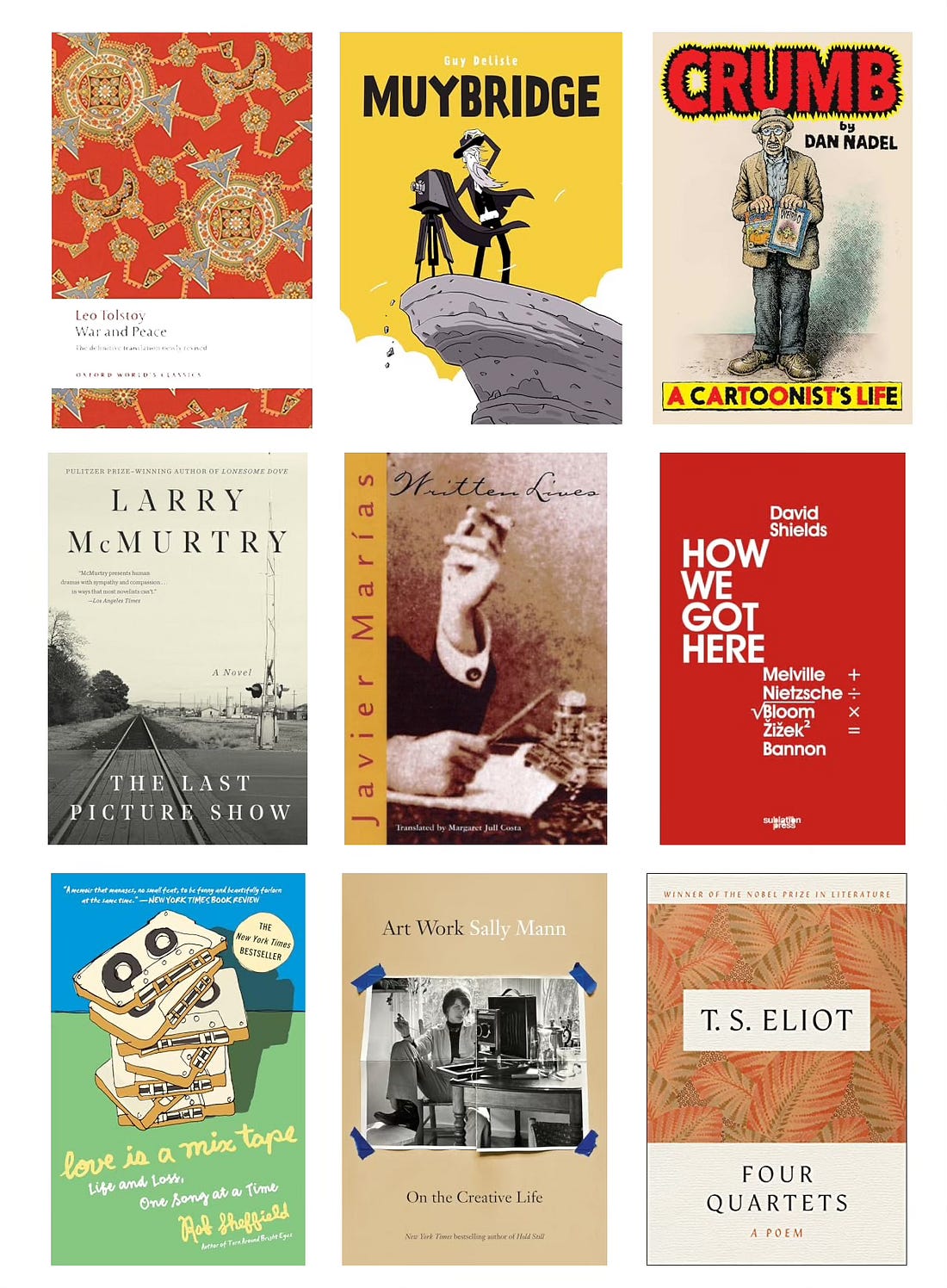|
 |
Hey y’all,
For something different this week, I wanted to share my 10 favorite reads of the year so far:
Leo Tolstoy, War and Peace. The “classics” are almost always weirder than you think they are. Like, within 50 pages of W&P, a bunch of drunks have tied a policeman to a bear and thrown them in the river. I try to read a really big book every summer (apparently I’m not the only one!), and this is one of the biggest, but it’s actually one of the easiest, I think — once you get the families and the names straight, it’s an adventure-filled soap opera, with short chapters that make it a easy to enjoy in little pieces over time. (I read the old-school Louise and Aylmer Maude translation.)
Guy Delisle, Muybridge. I think this book is a contemporary masterpiece? A cartoonist at the top of his game, a perfect meeting of subject and medium, and beautiful book design by Drawn and Quarterly. The story has it all: adventure, technological revolution, murder, etc. Much shorter than War and Peace — and it has pictures!
Dan Nadel, Crumb: A Cartoonist’s Life. A few years ago, I read an article about Taco Bell’s Innovation Kitchen, and wrote their “Distinctiveness Rule” down in my commonplace book: “You can change either the taste or the form, but you can’t change the taste and the form.” That’s what’s so interesting to me about Robert Crumb’s impact on comics, as put by Nadel himself: “There was this idea that Crumb was a bad boy breaking all the rules of the form. Actually he’s a traditionalist who figured out a way to use the language of comics to say entirely new things — to deal with adulthood in America in a frank and confrontational way, while maintaining unbelievable formal rigor.” (I also picked up Nadel’s companion anthology, Existential Comics: Selected Stories 1979-2004.)
Larry McMurtry, The Texasville Trilogy. I started reading Larry McMurtry’s The Last Picture Show after finally watching Peter Bogdanovich’s 1971 film adaptation. The minute I finished that novel, I started reading the sequel, Texasville, which came out in 1987 on the heels of McMurtry’s masterpiece, Lonesome Dove. It’s not as deep or quite as good as The Last Picture Show, but it’s funnier and more freewheeling. I then read the third in the trilogy, Duane’s Depressed, which came out in 1999. There are more Duane Moore books that McMurtry wrote, but 3 was just enough for me. (I also read Tracy Daughtery’s very good biography, Larry McMurtry: A Life.)
Javier Marías, Written Lives. A book of short essays about writers. “Although I have enjoyed writing all my books,” Marías wrote, “this was the one with which I had the most fun.” I had a lot of fun reading it, thanks to Elisa Gabbert’s annual year-end list of every book she read.
David Shields, How We Got Here. A short book that attempts to trace the history of ideas — from Melville to Dostoevsky to Bloom to Zizek to Bannon — that brought us to this contemporary moment when “truthiness” rules the day. I read it as a kind of sequel to Shields’ Reality Hunger, in which he argued that we crave “reality” because we experience hardly any for ourselves. (The way Shields uses quotes to build his argument was a big influence on Steal Like an Artist.)
[Redacted.] I share a lot with y’all, but I would never in a million years admit that I read this particular book. In fact, if you guess the book correctly in the comments, I’ll mail you a signed copy of one of my books:
